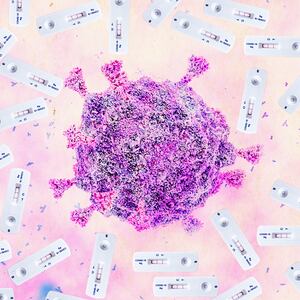Aside from the vaccine, one of the biggest reasons we’ve seen a drop in COVID deaths since the start of the pandemic is because of the development of effective treatments. Doctors and nurses are better equipped to help patients who come in with a serious case of the virus, shortening hospital stays and alleviating pressure on a strained medical system. And, as time passes, better and more effective treatments are being discovered—and sometimes in very surprising places.
That’s the case with some new research led by a team at Mount Sinai Hospital who discovered a strong “super-immunity” particle in llamas’ blood. Yes, you read that correctly: llamas’ blood. The same creatures known for chewing cud, spitting at tourists, and being voiced by David Spade.
In a study published today in the journal Cell Reports, the researchers found evidence that tiny immune molecules in llamas known as nanobodies could help develop an inhalable antiviral drug for COVID patients to serve as a fast-acting treatment to the pandemic. Moreover, the research suggests that it protects against every COVID variant—meaning we may have a future-proof treatment that will remain effective as the virus evolves.
“We learned that the tiny size of these nanobodies gives them a crucial advantage against a rapidly mutating virus,” Ian Wilson, a professor of structural biology at Scripps Research in La Jolla, California and co-author of the study, said in a press release. “Specifically, it allows them to penetrate more of the recesses, nooks, and crannies of the virus surface, and thus bind to multiple regions to prevent the virus from escaping and mutating.”
Creatures specifically in the biological family Camelidae including camels, alpacas, and llamas are capable of producing tiny antibodies that are about a tenth the size of a normal one. Despite their size, the antibodies are very hardy and can glom onto disease-causing intruders like the coronavirus very well. The researchers were able to hack the antibodies and link them together, ensuring that they’re even more effective against viruses.
“Because of their small size and broad neutralizing activities, these camelid nanobodies are likely to be effective against future variants and outbreaks of SARS-like viruses,” Yi Shi, associate professor of pharmacological sciences at Mount Sinai and lead author of the study, said in the release.
Shi added that the antibodies are also capable of protecting “both the upper and lower respiratory tracts against infection,” indicating they could be an effective drug when paired with vaccine and current antibody treatments.
This study builds off previous research into the awesome, super-immunity powers of llamas’ blood that actually predates the pandemic. With the urgency of the pandemic, though, it makes sense that researchers would want to revisit our wooly, mountain-climbing friend.
However, it’d behoove everyone to keep in mind that this is still in fairly early stages. Much more research needs to be done in order to refine and develop an actual treatment. And if the whole horse dewormer fiasco has taught us anything, it’s that we should avoid jumping to knee jerk conclusions before the research has been done.
In other words, for the love of everything holy, don’t go out and start slaughtering llamas and drinking their blood. That won’t help you. It’ll do the opposite of helping you. In fact, you might end up being cursed a la “The Emperor's New Groove” and become a llama yourself.








